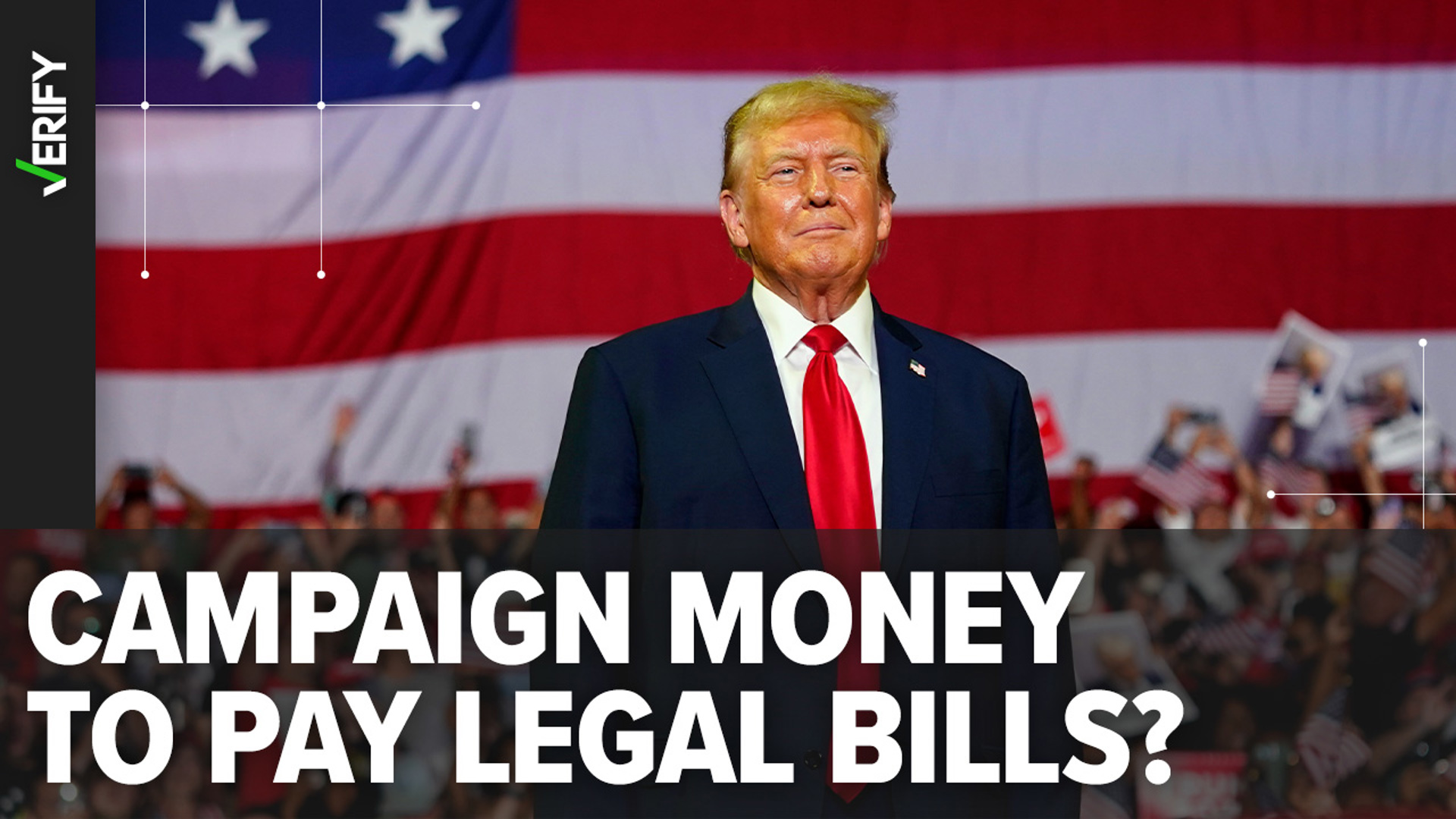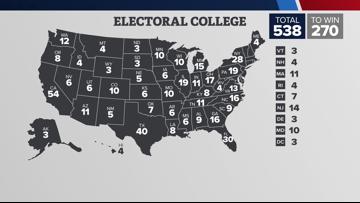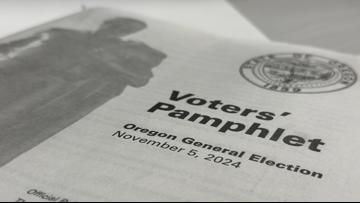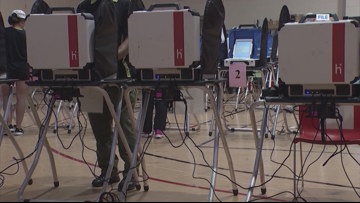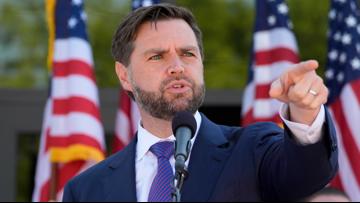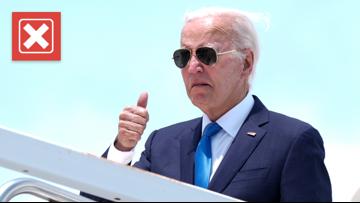In late May, former President Donald Trump was convicted of 34 felony counts of falsifying business records in his New York hush money case.
This criminal case is one of four brought against Trump. He has also been the subject of several civil cases in New York, including two lawsuits brought by advice columnist E. Jean Carroll in which Trump was found liable for sexually abusing and defaming her.
The former president has used tens of millions of dollars worth of funds donated to his campaign and political committees to cover his mounting legal fees, the nonprofit OpenSecrets says. That’s led many VERIFY readers to ask if it’s legal for Trump and other presidential candidates to use campaign funds to pay their legal bills.
Here’s what we can VERIFY.
THE SOURCES
- Federal Election Commission (FEC)
- Report published by the Brennan Center for Justice
- Campaign Legal Center
- OpenSecrets, a nonprofit organization based in Washington, D.C., that tracks data on campaign finance and lobbying
- Congressional Research Service
- Marina Pino, counsel in the Brennan Center’s Election and Government Program who focuses on issues related to money in politics
- Ciara Torres-Spelliscy, a law professor at Stetson University
- Michael Kang, a law professor at Northwestern University who specializes in campaign finance
- Saurav Ghosh, director of federal campaign finance reform for the Campaign Legal Center
WHAT WE FOUND
Campaign finance law sets rules for how political candidates can use campaign funds. But there are many legal gray areas that can make it difficult to say exactly what’s allowed and what’s not.
Much of Trump’s spending on his legal bills falls into those gray areas in campaign finance law, experts at the Brennan Center for Justice wrote in a May 2024 report.
Campaign finance rules differ depending on the type of donation that a candidate receives.
There are a variety of ways that federal political candidates can raise money to fund their campaigns, but we’ll touch on two of the main ones: contributions to their campaigns and PACs.
People can make direct donations to a candidate’s campaign or to separate organizations called political action committees (PACs), which pool contributions and direct them to campaigns based on their interests.
The Federal Election Commission (FEC), which administers and enforces campaign finance laws, says money donated directly to a candidate’s campaign cannot be used for personal expenses, including legal fees. But even that can be up for interpretation because it’s not always clear which expenses are considered personal.
That same ban on using campaign funds for personal expenses doesn’t apply to PAC money. Trump has used money from various PACs to pay for his legal bills.
Spending rules for a candidate’s campaign funds
Candidates can use money donated directly to their campaign to pay for some legal expenses. But they aren’t allowed to use any of that money on legal fees related to personal matters.
Under FEC regulations from the Federal Election Commission (FEC), candidates are allowed to use their campaign funds for spending that is directly related to their campaign or responsibilities in office.
This could include anything from paying for internet access at a campaign office to legal bills associated with making sure their name is on the ballot.
However, under the same FEC rules, campaign funds cannot be used to pay for any personal expenses – including legal fees.
The FEC defines “personal use” as any “commitment, obligation or expense of any person that would exist irrespective of the candidate’s campaign or responsibilities as a federal officeholder.”
It also has a list of expenses that are automatically considered personal use, including household food items and supplies; funeral, cremation and burial expenses; clothing; tuition payments; mortgage, rent and utility payments; investment expenses; entertainment; dues, fees and gratuities; and salary payments to a member of the candidate’s family, unless the family member is providing bona fide services to a campaign.
But even these rules are up for interpretation since it’s not always clear which category certain expenses, like Trump’s legal bills, fall into.
Some legal experts, like Stetson University law professor Ciara Torres-Spelliscy, argue the use of campaign funds to pay for his Mar-a-Lago classified documents case would violate personal use rules. That’s because the alleged crimes happened after Trump was president and while he was not a candidate for office, she said.
Michael Kang, a law professor at Northwestern University who specializes in campaign finance, agrees. He said it’s easier to make a case for putting campaign funds toward litigation involving Trump as a candidate contesting the 2020 election results.
The FEC says it determines on a “case-by-case basis” whether expenses for things like meals, travel and legal expenses are considered personal use.
It can also launch an investigation into any potential campaign finance violations if someone files a complaint or the agency receives a referral. But the FEC often deadlocks over starting investigations into alleged violations, Torres-Spelliscy and Pino said.
The FEC isn’t the only government agency that can enforce campaign finance law. The Department of Justice has the power to prosecute federal violations of campaign finance law and can take action without the FEC doing so first, according to Torres-Spelliscy.
Spending rules for PAC funds
Campaign finance law doesn’t explicitly prohibit spending PAC money on personal expenses.
Almost all of the money for Trump’s legal expenses is coming from various affiliated PACs, according to the Brennan Center experts. That’s why the way he’s paying his legal bills is “not necessarily illegal,” they said.
The FEC has “made it abundantly clear that it will not regulate personal use of leadership PAC funds,” the Campaign Legal Center (CLC) says. And, due to a “quirk” in campaign finance law, personal use restrictions also do not cover traditional PACs or super PACs, both of which have put money toward Trump’s legal bills, according to the Brennan Center report.
“These loopholes are well known” and federal candidates often take advantage of them, the Brennan Center says.
Leadership PACs, which can be formed and controlled by candidates instead of outside interest groups, in particular have become “common conduits for significant personal spending by federal candidates in the past,” Pino said.
Some candidates have used these leadership PAC funds for “personal vacations, Disney World and event tickets, five-star resorts and more,” according to Saurav Ghosh, director of federal campaign finance reform for the CLC.
For example, from January 2019 to December 2020, the leadership PAC for Rep. Gwen Moore (D-Wi.) spent $9,000 for event tickets, according to an investigation from Issue One and the CLC.
During that same time period, the leadership PAC for Rep. Ted Cruz (R-Tx.) spent more than $12,000 for facility and equipment rentals from the Houston Astros baseball team, the investigation found.
